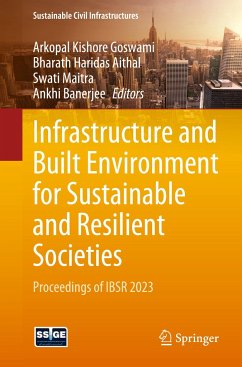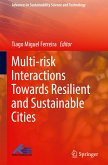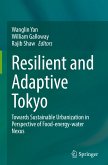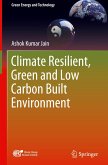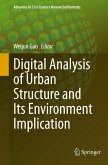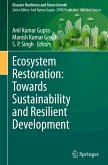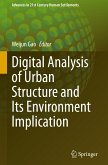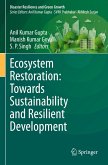Infrastructure and Built Environment for Sustainable and Resilient Societies
Proceedings of IBSR 2023
Herausgegeben:Goswami, Arkopal Kishore; Aithal, Bharath Haridas; Maitra, Swati; Banerjee, Ankhi
Infrastructure and Built Environment for Sustainable and Resilient Societies
Proceedings of IBSR 2023
Herausgegeben:Goswami, Arkopal Kishore; Aithal, Bharath Haridas; Maitra, Swati; Banerjee, Ankhi
- Broschiertes Buch
- Merkliste
- Auf die Merkliste
- Bewerten Bewerten
- Teilen
- Produkt teilen
- Produkterinnerung
- Produkterinnerung
This book presents the select proceedings of the Annual Conference on "Infrastructure and Built Environment: Towards Sustainable and Resilient Societies" (IBSR 2023). It covers the latest research and technologies in the area of smart and sustainable built environment for inclusive societies. Various topics covered in this volume are multimodal urban transport, spatial informatics in urban planning, urban morphology, sustainable transport infrastructure development and many more. This book will be useful for researchers and professionals working in the fields of urban mobility, affordable housing, road infrastructure, and spatial informatics. …mehr
Andere Kunden interessierten sich auch für
![Multi-risk Interactions Towards Resilient and Sustainable Cities Multi-risk Interactions Towards Resilient and Sustainable Cities]() Multi-risk Interactions Towards Resilient and Sustainable Cities145,99 €
Multi-risk Interactions Towards Resilient and Sustainable Cities145,99 €![Resilient and Adaptive Tokyo Resilient and Adaptive Tokyo]() Resilient and Adaptive Tokyo158,99 €
Resilient and Adaptive Tokyo158,99 €![Climate Resilient, Green and Low Carbon Built Environment Climate Resilient, Green and Low Carbon Built Environment]() Ashok kumar jainClimate Resilient, Green and Low Carbon Built Environment121,99 €
Ashok kumar jainClimate Resilient, Green and Low Carbon Built Environment121,99 €![Digital Analysis of Urban Structure and Its Environment Implication Digital Analysis of Urban Structure and Its Environment Implication]() Digital Analysis of Urban Structure and Its Environment Implication137,99 €
Digital Analysis of Urban Structure and Its Environment Implication137,99 €![Ecosystem Restoration: Towards Sustainability and Resilient Development Ecosystem Restoration: Towards Sustainability and Resilient Development]() Ecosystem Restoration: Towards Sustainability and Resilient Development161,99 €
Ecosystem Restoration: Towards Sustainability and Resilient Development161,99 €![Digital Analysis of Urban Structure and Its Environment Implication Digital Analysis of Urban Structure and Its Environment Implication]() Digital Analysis of Urban Structure and Its Environment Implication137,99 €
Digital Analysis of Urban Structure and Its Environment Implication137,99 €![Ecosystem Restoration: Towards Sustainability and Resilient Development Ecosystem Restoration: Towards Sustainability and Resilient Development]() Ecosystem Restoration: Towards Sustainability and Resilient Development161,99 €
Ecosystem Restoration: Towards Sustainability and Resilient Development161,99 €-
-
-
This book presents the select proceedings of the Annual Conference on "Infrastructure and Built Environment: Towards Sustainable and Resilient Societies" (IBSR 2023). It covers the latest research and technologies in the area of smart and sustainable built environment for inclusive societies. Various topics covered in this volume are multimodal urban transport, spatial informatics in urban planning, urban morphology, sustainable transport infrastructure development and many more. This book will be useful for researchers and professionals working in the fields of urban mobility, affordable housing, road infrastructure, and spatial informatics.
Produktdetails
- Produktdetails
- Sustainable Civil Infrastructures
- Verlag: Springer / Springer Nature Singapore / Springer, Berlin
- Artikelnr. des Verlages: 978-981-97-1502-2
- 2024
- Seitenzahl: 272
- Erscheinungstermin: 12. Mai 2024
- Englisch
- Abmessung: 235mm x 155mm x 15mm
- Gewicht: 417g
- ISBN-13: 9789819715022
- ISBN-10: 9819715024
- Artikelnr.: 69901541
- Herstellerkennzeichnung Die Herstellerinformationen sind derzeit nicht verfügbar.
- Sustainable Civil Infrastructures
- Verlag: Springer / Springer Nature Singapore / Springer, Berlin
- Artikelnr. des Verlages: 978-981-97-1502-2
- 2024
- Seitenzahl: 272
- Erscheinungstermin: 12. Mai 2024
- Englisch
- Abmessung: 235mm x 155mm x 15mm
- Gewicht: 417g
- ISBN-13: 9789819715022
- ISBN-10: 9819715024
- Artikelnr.: 69901541
- Herstellerkennzeichnung Die Herstellerinformationen sind derzeit nicht verfügbar.
Dr. Arkopal Kishore Goswami is an Associate Professor, and currently the Chairperson of the Ranbir and Chitra Gupta School of Infrastructure Design and Management, IIT Kharagpur. He received his PhD from University of Virginia in Civil Engineering in the year 2008. His research interests are in planning & design of sustainable urban transport infrastructure in the context of organic urban forms and mixed traffic environment. He has collaborated with researchers from around the globe, including Japan, Germany, UK, Colombia, and USA. He has been a recepient of multiple sponsored research grants from national and international agencies. He is a member of the IRC committee on Urban Roads (H-8), and an Executive Committee Board Member of the Transportation Research Group (TRG), India. He mentors the Multimodal Urban Sustainable Transportation (MUST) laboratory in IIT Kharagpur, the research outputs from which have been published in international peer reviewed journals of repute. Dr. Goswami has been conferred with the Faculty Excellence Award 2022 by IIT Kharagpur. Dr. Bharath H. Aithal is a Faculty (Assistant Professor) at Indian Institute of Technology Kharagpur. He Obtained his B.E from Bangalore university in 2009 and Doctoral degree from Indian Institute of Science (IISc) in 2015. He has published 55 Journal papers, 14 Book chapters, 120 Conference proceedings, and 40 Technical reports and authored three books. He has won several awards such as Schlich Prize, IEI Young engineer award and Indian National Geospatial award to name a few. Currently he is an Academic editor in Plos climate. Dr. Swati Maitra is currently an Assistant Professor in Ranbir & Chitra Gupta School of Infrastructure Design and Management, IIT Kharagpur. She obtained her PhD from IIT Kharagpur, M.Tech. from IIT Bombay and B.E. from Bengal Engineering College, Shibpur (presently Indian Institute of Engineering Science and Technology, Shibpur) in Civil Engineering. Dr. Maitra is a researcher in the field of sustainable infrastructure development with major focus on transport infrastructure, concrete pavement and overlay analysis, design and performance evaluation, road safety, retrofitting and rehabilitation of existing built infrastructure and sustainable concrete and cementitious materials for infrastructure development. Dr. Maitra has several research publications in book chapters, International and National Journals and Conferences. She has received several awards like DAAD Fellowship by the German Academic Exchange Service, Bihar PWD Medal by the Indian Roads Congress (IRC), and best research paper awards for Enlightening Asia-specific topics and pavement research in International Conferences. Dr. Maitra has organized several Short-term courses and training programs and is an active member of Indian Roads Congress involving in developing/revising IRC guidelines. Dr. Maitra is actively involved in several research and industry projects as Principal Investigator. Her research is aimed to provide practical implications in real field so as to connect research into practice. Dr. Ankhi Banerjee is currently working as an Assistant Professor at Ranbir & Chitra Gupta School of Infrastructure Design and Management, Indian Institute of Technology, Kharagpur. Her research interests include Housing Affordability, Livability and Urban Infrastructure, Urban Design, Urban Morphology and Sustainable Tourism. Dr. Banerjee has published research findings through publications in reputed peer reviewed journals, International and national conferences, and book chapters. Dr. Banerjee has been closely associated with several projects based on Smart Urban Regeneration, Development of Index as a measure of Happiness in new Town, Kolkata and Improvement of Corridor based Traffic Mobility and has also collaborated with researchers from UK and US. She was Principal Investigator of a research project which aimed at developing an Integrated Housing and Transportation Model under the Scheme for Promotion of Academic and Research Collaboration (SPARC). Dr. Ankhi Banerjee has completed her graduation in Architecture and post-graduation in Urban Design from Jadavpur University. Dr. Banerjee has previously taught in the Department of Planning and Architecture, National Institute of Technology, Rourkela.
Part I: Multimodal Urban Transport.- Chapter 1: Transportation Hub as an Urban Magnet: a Case of Nagpur Metro.- Chapter 2: Identification of Indicators for Shared E-mobility Plan in a Tier-II City: a Case of Bhopal.- Chapter 3: Identifying Potential for Non-motorized Transportation: a Case of Siliguri.- Chapter 4: Potential of Alternative Technology for Urban Freight - a Case of Dehradun.- Chapter 5: Assessing Non-motorized Mobility Planning: a Case of Indore City.- Part II: Sustainable Transport Infrastructure Development.- Chapter 6: Road Safety Assessment of Hill Roads: a Case Study of Dehradun, Mussoorie.- Chapter 7: Why Pedestrians Do Not Walk on Walkways? Assessment of Pedestrian Infrastructure Based on Pedestrian Behaviors.- Chapter 8: Driver Skill Profiling Using Machine Learning.- Chapter 9: Investigating Role of Range Anxiety in Electrification of Shared Mobility.- Part III: Smart and Inclusive Habitat.- Chapter 10: Holistic Age-friendly Communities: a Comprehensive Literature Review on Factors Affecting the Elderly Experience in Built Environments.- Chapter 11: Spatial Distribution of Human Development Indicators Using Census Data: Case of Kolkata Urban Agglomeration.- Chapter 12: Are the Gated Mass High-rise Housing Developments Livable? A Case of Ahmedabad, India.- Chapter 13: Assessing Urban Morphology and Spatial Histories Through Space Syntax: Case of Varanasi, India.- Part IV: Spatial Informatics in Urban Planning.- Chapter 14: Quantitative Assessment of Urban Road Network Hierar-chy, Topology and Walkable Access Using Open-source GIS Tools.
Part I: Multimodal Urban Transport.- Chapter 1: Transportation Hub as an Urban Magnet: a Case of Nagpur Metro.- Chapter 2: Identification of Indicators for Shared E-mobility Plan in a Tier-II City: a Case of Bhopal.- Chapter 3: Identifying Potential for Non-motorized Transportation: a Case of Siliguri.- Chapter 4: Potential of Alternative Technology for Urban Freight - a Case of Dehradun.- Chapter 5: Assessing Non-motorized Mobility Planning: a Case of Indore City.- Part II: Sustainable Transport Infrastructure Development.- Chapter 6: Road Safety Assessment of Hill Roads: a Case Study of Dehradun, Mussoorie.- Chapter 7: Why Pedestrians Do Not Walk on Walkways? Assessment of Pedestrian Infrastructure Based on Pedestrian Behaviors.- Chapter 8: Driver Skill Profiling Using Machine Learning.- Chapter 9: Investigating Role of Range Anxiety in Electrification of Shared Mobility.- Part III: Smart and Inclusive Habitat.- Chapter 10: Holistic Age-friendly Communities: a Comprehensive Literature Review on Factors Affecting the Elderly Experience in Built Environments.- Chapter 11: Spatial Distribution of Human Development Indicators Using Census Data: Case of Kolkata Urban Agglomeration.- Chapter 12: Are the Gated Mass High-rise Housing Developments Livable? A Case of Ahmedabad, India.- Chapter 13: Assessing Urban Morphology and Spatial Histories Through Space Syntax: Case of Varanasi, India.- Part IV: Spatial Informatics in Urban Planning.- Chapter 14: Quantitative Assessment of Urban Road Network Hierar-chy, Topology and Walkable Access Using Open-source GIS Tools.

